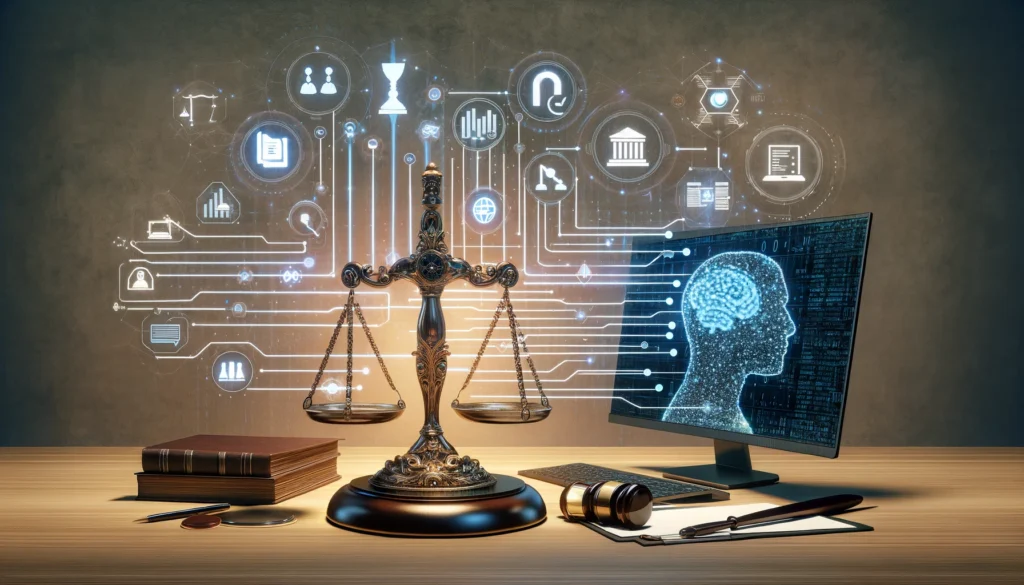
Laying the Groundwork: Understanding ChatGPT’s Utility in Corporate Law
Artificial Intelligence (AI) has been making waves across various sectors, and the legal industry is no exception. AI’s ability to process vast amounts of information quickly and accurately provides an invaluable resource for practitioners. For paralegals in the corporate law sphere, AI tools like ChatGPT can streamline research processes, allowing for quicker turnaround times and improved accuracy.
Paralegals can particularly benefit from AI given their role in conducting preliminary research, drafting documents, and ensuring compliance. ChatGPT can assist in parsing through complex regulations, suggesting legal frameworks, and even identifying potential legal issues that might have been overlooked. Utilizing such advanced technology, paralegals can enhance their efficiency and contribute more effectively to their legal teams.
Setting Up for Success: Getting Started with ChatGPT
Before diving into complex queries, it’s crucial to know how to set up ChatGPT. Begin by accessing the platform through the OpenAI website or API integration in legal software. Depending on your needs, you might choose between the free version or a subscription-based service. The latter typically offers more advanced features and higher usage limits, ideal for heavy research tasks.
To configure ChatGPT for legal research, familiarize yourself with its settings and customization options. Adjust parameters such as response length and sensitivity to ensure the AI provides thorough yet concise answers. By optimizing these settings, you can tailor ChatGPT to deliver information that is both relevant and accurate.
Smart Prompts for Swift Answers: Crafting Effective Queries
The effectiveness of ChatGPT largely depends on the quality of the queries you input. Structured, precise prompts yield the best results. Instead of broad questions, narrow your focus to specific topics within corporate law. This helps the AI understand and process your query more effectively.
For instance, instead of asking, “Explain corporate law,” a more targeted prompt would be, “What are the key regulations governing mergers and acquisitions under U.S. corporate law?” Such prompts direct the AI to specific areas, saving time and providing useful information directly relevant to your needs.
Examples of well-crafted prompts include:
- “List the compliance requirements for SEC filings in a public company acquisition.”
- “Explain the legal framework for antitrust laws and how they affect mergers.”
Refining your queries not only ensures more accurate responses but also helps in quickly pinpointing relevant details. For best results, keep your questions clear, concise, and specific to the matter at hand.
Diving Deep: Advanced Prompt Techniques for Detailed Research
For more intricate inquiries, advanced prompt techniques come into play. Complex legal questions require layered questioning and continuous refinement. Start with a broad query, then use follow-up questions to delve deeper into specific areas.
For example, begin with, “What are the steps involved in a hostile takeover?” After receiving a general overview, use follow-ups like, “What legal defenses can a company employ against a hostile takeover?” and “Provide case law examples of successful hostile takeover defenses.”
When conducting deep research, it’s essential to corroborate the information from ChatGPT with reputable sources. Utilize legal databases, primary sources, and regulatory guidelines to ensure the data’s accuracy.
Efficiency Hacks: Top Prompts for Common Corporate Law Tasks
Incorporating ChatGPT into routine legal tasks can significantly enhance efficiency. Common tasks such as document drafting, compliance checks, and due diligence can benefit from AI-powered assistance.
Consider the following prompts for different tasks:
- Document Drafting: “Draft a due diligence checklist for an IPO under the SEC’s guidelines.”
- Compliance Checks: “Summarize the compliance requirements for GDPR in corporate transactions.”
- Due Diligence: “Create a list of items to review when conducting due diligence on a target company.”
By using specific prompts tailored to these common tasks, paralegals can achieve quicker, more accurate results, freeing up time for more complex work.
Compliance and Accuracy: Ensuring Reliable Information
While ChatGPT is a powerful tool, verifying the accuracy of the information it provides is crucial. Cross-referencing the AI’s output with authoritative sources helps ensure reliability. Legal databases, government websites, and accredited publications should be your go-to for verification.
Moreover, always consider the legal and ethical implications of using AI in research. Ensure that the information complies with local regulations and standards, preserving the integrity and confidentiality of the data.
Staying Updated: Using ChatGPT for Ongoing Education and Updates
A vital aspect of legal practice is staying current with new regulations and legal trends. ChatGPT can assist by providing regular updates on pertinent legal developments. Set up automated prompts to receive periodic reports on changes in corporate law, noteworthy cases, and regulatory updates.
For instance, configuring a prompt such as, “Provide a monthly update on major changes in SEC regulations,” can help you stay informed without manually searching for updates.
Limitations and Workarounds: Navigating ChatGPT’s Shortcomings
Despite its advanced capabilities, AI has its limitations. ChatGPT may not always have access to the most current information, and its understanding can be affected by the nuances of legal language. Be prepared to use traditional research methods when necessary, particularly for highly specialized or sensitive queries.
Complement ChatGPT with other tools like legal databases, journals, and expert consultations. These workarounds provide a balanced and thorough approach to legal research.
The Future of Legal Research: Integrating ChatGPT into Daily Workflow
Envisioning a future with AI-assisted legal research involves seamlessly incorporating ChatGPT into daily tasks. Begin by identifying routine tasks that can be automated and gradually expand the scope as you become more comfortable with the technology. Encouraging continuous learning and adaptation ensures that you stay ahead of the curve.
AI represents a transformative shift in legal research, offering increased efficiency and accuracy in handling complex tasks. Embracing this technology can lead to significant advancements in the legal field.
Closing the Loop: Final Thoughts and Best Practices
In closing, utilizing ChatGPT for corporate law research can significantly enhance your efficiency and accuracy. From crafting effective queries to ensuring reliable information, AI offers powerful tools to streamline your workflow.
Experiment with ChatGPT, tailoring its use to your specific needs. Mastering this technology can position you at the forefront of a rapidly evolving legal landscape.


